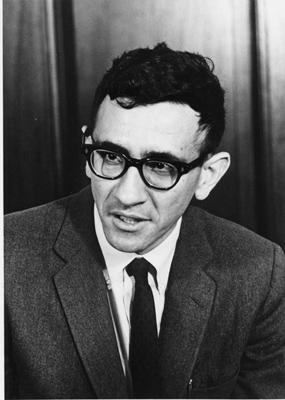Don't Even Dream of It
By Allen Guttmann
My first day in Amherst began with a solitary breakfast at the Lord Jeffery Inn. At 9 a.m., Theodore Baird, the English professor who dominated the department as completely as Samuel Johnson had dominated literary London in James Boswell’s day, came to escort me to my interview with President Charles W. Cole, whom nobody, not even the trustees, addressed as “Charlie.” Baird and I crossed the snow-covered Quad and approached Johnson Chapel. A bright red sports car was parked in front. Baird gave the left front tire a tremendous kick. Congealed slush fell to the ground. “You wouldn’t think a minister would drive a car like that, would you?” Baird said in a deeply graveled voice. I didn’t answer, which I soon learned was the correct response to Baird’s rhetorical questions.

Baird left me at Cole’s office on the chapel’s second floor. Looking down at my dossier, Cole asked, “How did you manage to get through the University of Florida in only three years?” That was a long story to tell a busy president. I gave him the short version.
“I ran away from home my senior year in high school because my father didn’t want me to go to college. I had delivered newspapers for three years and had saved enough money to get through my freshman and sophomore years, but I didn’t have enough, even with summer jobs, for an additional two undergraduate years. I was lucky. I discovered that the university considered a student to have passed a course if the student took and passed the course examination—whether or not the student had enrolled in the course. Courses for freshmen and sophomores were so elementary that I passed five-sixths of them ‘by examination.’ Then, with a heavier-than-average schedule, I graduated in three years with a debt of less than $2,000.” (This was equivalent to the average family income for one year. Educational debt is not a 21st-century invention.) I left the interview with the sense that Cole, an economic historian, was favorably inclined.
Next I interviewed with George Rogers Taylor (economics and American studies) and Edwin Rozwenc (history and American studies) in Morgan Hall. Taylor was destined to become my father figure, a man whom I truly loved. He didn’t say much that morning, but Rozwenc grilled me. In my dissertation on American interpretations of the Spanish Civil War, I had some negative remarks on Anna Louise Strong, an American radical noted for her devotion to the Soviet Union. It turned out, as Rozwenc’s questions became increasingly pointed, that Anna Louise Strong was his maternal aunt. He didn’t share her politics, but he wanted to make sure that I had my facts right. He smiled when he handed me off to G. Armour Craig (English) for lunch at the Lord Jeff.
A handsome man with perfect manners, Craig was Baird’s most favored protégé. He published very little, but very little was quite sufficient in those days and it didn’t hurt that his essay on Jane Austen’s Emma appeared in a collection edited by two distinguished Harvard-based Amherst alumni.
Leo Marx (English) was at the lunch. He had been one of my graduate-school teachers at the University of Minnesota, and he was the one who had urged his colleagues in English and American studies to look at candidates who had not been preselected by Amherst alumni at Harvard or Columbia. After all, it was only an instructor-level temporary job.
Craig was far more curious about my time at the University of Florida than he was about my analysis of Ernest Hemingway’s passionate involvement in the Spanish Civil War. I don’t remember how I came to mention my summer job on the night crew of Miami Beach’s super-posh Saxony Hotel, but Craig seemed fascinated. Craig was also curious about my two years as an enlisted volunteer—not an officer—in the U.S. Army. Had I really been invited, during basic training, to rid my company of a distracting problem by murdering an exasperating, mentally retarded Jehovah’s Witness who had been drafted by mistake? Yes. The draftee’s name was Lovelady and we shared a tent for two. I shaved him in the morning and dressed him for reveille and declined the invitation to murder.
Craig had other questions. Had I really, while stationed in Germany, won a middle-of-the-night fistfight against a drunken bully who promised to kill me as soon as he was sober? Yes. My last fistfight was a technical KO.
My wintry visit to Amherst was in 1959, a decade before “diversity” became a priority at the college, but I am convinced that Craig decided, by the time we’d finished lunch, to take me on as a not-too-extreme representative of “otherness.” If Leo Marx wanted to experiment with someone from the hinterland, Allen Guttmann (B.A., University of Florida, 1953), would do. By the time Marx dropped me off in Springfield, where I caught the bus to Bradley Field, I thought that I had probably passed muster. Marx must have thought so too, because he warned me, “It’s temporary. Don’t even dream of staying longer than five years.” I didn’t dream of it, but here I am, 53 years later. As for Marx, a charismatic teacher whose Machine in the Garden (1964) became a classic of American literary history, he left for MIT.
Guttmann is the Emily C. Jordan Folger Professor of English and American Studies.